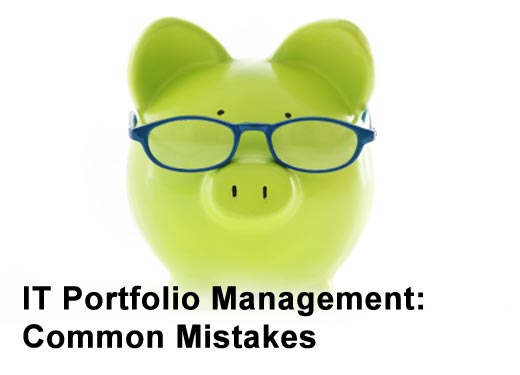According to Vaughan Merlyn, IT Portfolio Management is at the heart and soul of leveraging IT for business value, and yet most IT organizations do a poor job of managing IT investments as a portfolio. At its best, IT Portfolio Management (PfM) is a way to:
- Define your investment strategy for IT – including needs for risk/return, innovation, common enterprise-wide capability.
- Make that strategy visible and understandable to business executives to allow dialog and debate to reach agreement with key business stakeholders.
- Monitor performance of the IT portfolio.
- Adjust the portfolio based upon actual performance of IT investments.
- Adjust the portfolio based upon changing business conditions.
At its worst, PfM is simply a laundry list of projects or a collection of laundry lists, one or more for each business unit and corporate function. Mr. Merlyn has developed this list of common mistakes that are made in PfM.
Click through for four common mistakes businesses make in their IT Portfolio Management (PfM), as outlined by Vaughan Merlyn.
There really is no tangible IT investment strategy – just a bucket of money and funding sources. Projects get picked off until the bucket and funding is consumed – everything else sits in a backlog. When projects are prioritized, it tends to be based on meeting the needs of individual business units rather than achieving broader corporate business goals.
Business executives have a hard time understanding and engaging in portfolio investment decisions based upon laundry lists of projects – in fact, it can’t be done! Companies that manage a laundry list of IT projects rather than taking a more strategic and holistic view of portfolio management primarily evaluate their projects from a time/budget perspective, which reveals little about overall business value.
Not thinking about risk/return profiles in a meaningful way tends to emphasize low-risk, low-return initiatives and starves the enterprise of the more innovative and potentially “game changing” IT plays.
Often the portfolio only addresses new, major project initiatives – IT services and smaller projects are not under the umbrella of PfM – and yet these “non-big” activities typically consume 60 percent to 70 percent of the IT budget – the lion’s share is untouched by PfM disciplines.







